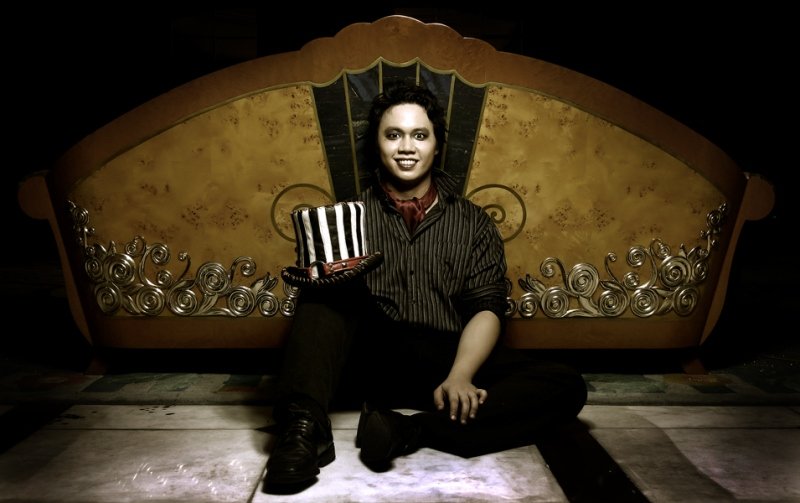U.S.A. –
Henry Rollins has come a long way since leading the legendary and infamous punk rock band Black Flag, yet his unreticent and straightforward approach has never wavered. Now an avid traveller amid his work as an activist, performer, author, actor and photojournalist, Rollins is truly a jack of all trades on a constant quest to be educated in the ways of the world through travelling, and begs all others do to the same. His latest book Occupants featuring moving and emotionally charged photographs from less popular travel destinations such as North Korea, Kyrgzystan, Kuwait, Iraq, Syria, Mali and Saudi Arabia embodies the frank and unequivocal tone of Rollins which resonates through it’s pages and screams the truths of warfare towards the reader. Emaho caught up with Rollins in a revealing interview to discuss his latest book and the importance of travel.
Emaho : You’re an enthusiastic advocate of travelling; in fact one of your quotes “I beg young people to travel…” is particularly renowned. When was the first time you realized the importance of travelling?
It was when music allowed me to travel. I saw that the stereotypes of a place or people didn’t match with what I was seeing. Rarely was I told something nice about a place but then I would find it to be a nice place. You have to find out for yourself.
Emaho : You’ve said that in order to gain the most enriching experiences out of travel it’s important to show respect and genuine curiosity when visiting places. What other suggestions do you have for people looking to travel, particularly to those more hard-to-reach places?
Research on any location is key. You don’t want to walk into a place not knowing where you are, that’s just bad strategy. You take a calculated risk when you go anywhere, so you want to try and know a bit about where you’re ending up. Or, perhaps you don’t and that’s the adventure. For me, I think some planning, especially so I can understand customs of politeness in a place that I am unfamiliar with is important. It’s the small things that often end up being important.

Nepal Election © Henry Rollins
Emaho : In another interview you said that punk rock initiated your political voice yet travel really opened your eyes. How has travelling impacted on your political ideals and the way you approach seeking change?
When you go far and wide, you see how the rest of the world gets by and sometimes, it can be quite the awakening. Why is this family on the verge of starvation and America has an obesity problem? What does climate change look like on the African continent? What does intolerance look like when fuelled by poverty? You’ll have to go to find out. You might conclude that there are global winners and losers and that they are chosen by some obscenely powerful people. Not everyone’s going to make it. Most of the time, you and your friends, all westerners, you will make it, so your consideration of things comports to that. Try talking to an elderly Dinka man about retirement, or a vacation or savings and interest. By travelling, you get out of your way of seeing things, valuing things, and you can really have an opportunity to think differently.
Emaho : A powerful theme you often discuss is the positive impact travel can have on people’s perceptions and attitudes towards war. Why do you think “seeing what it [war] looks like” is so compelling?
Because you see how much it’s not a movie with an ending. These wars don’t end. The cluster bombs dropped in Laos by Nixon are still wounding and killing people. Agent Orange still takes its toll in Vietnam. Presidents should be ashamed to go to war, not running towards it. It shouldn’t even be in the discussion, but it is. There is a lot of money to be made with conflict, so there might always be war. Hard to sell someone on the idea once they have walked through the aftermath of one and seen how long it sticks around and the incredible amount of human suffering that is the result.

Masaka, Uganda © Henry Rollins
Emaho : A pressing view is that the majority of media giants in first world countries have corporate goals that lead to pro-war agendas. Given this, and the fact that many people can’t or won’t travel to war torn countries, how do you think it’s possible to make war irrelevant?
It has to be a change of mind. No longer valuing war and the profits made. How do you do that? How are you pro peace when you know that the LRA is abducting people and killing them? When you stop them, what does that make you? This is what the UN and other peacekeeping forces are tasked with. What do you do about what’s happening in Chechnya? Go to Putin and Kadyrov and ask them to cool it? Humans fight. They also innovate. They get better toys to kill each other with. They’re into it, too. I don’t know what to do about that besides not do it myself.
Emaho : What are some of your more memorable travel experiences that you think might encourage more people from first world countries to travel?
Too many to mention. I think one of the big overall take away is the incredible kindness and generosity of people in countries you’re supposed to be afraid of. The lack of judgment, the curiosity that matches your own. You are forced to deal with the sheer awesomeness of human beauty.

Tibet © Henry Rollins
Emaho : In a radio interview you have been quoted as saying “This is where my anger takes me, to places like this, not into abuse but into proactive, clean movement.” When did this path of involving yourself in to social activism become clear to you? Of the many causes worthy of support what stands out for you?
There are many good causes to be a part of. All you need to do is pick one. One is fine. I don’t work with these organizations because I am an incredibly nice guy, I work with them because I am mad at the fact that there are people getting done over by someone else. There is a local orphanage I contribute to in Los Angeles. I like kids just fine but my main motivation is anger at the hand they were dealt. You have at least two ways to go with that. You can find the deadbeat parents and, I don’t know, cane them? Or, you can help the kid have a shot. The way to go seems pretty clear to me.
Emaho : As a highly opinionated punk rocker and avid supporter of the American first amendment, it must have been very difficult in the beginning to travel to places where the right to free speech is not firmly entrenched; both in adjusting your own behaviour and coping with the behaviour of others. How did you deal with this?
Honestly, I have never felt all that censored. In Iran, China and North Korea I have, but elsewhere, not all that much. I had to censor myself around my parents and teachers a lot more.

Democratic People’s Republic of Korea © Henry Rollins
Emaho : You won a Grammy in 1994 for Best Spoken Word Album for “Get in the Van: On the Road with Black Flag”, the same year you were nominated for Best Heavy Metal Performance for “Liar”. How was the feeling? How important are awards and the recognition that follows with it, for you?
I guess it’s nice to be given the hurrah by your “peers” but it’s not a world I live in, really. To me, it’s like being evaluated by someone who actually knows very little of what you do, so it’s a checked swing. It’s never anything that I bring up.
Emaho : You visited India on the 25th anniversary of the Bhopal Gas Tragedy. What is your take on multinational companies setting up hazardous plants in developing countries? How do you see better accountability being introduced? Can you share your experience from your visit to India?
Multinationals do this kind of thing all the time. You can literally get away with murder in some of these places. These people have no lawyer, no voice, no traction, nothing. So, you can do what you want. They wouldn’t do it in Pennsylvania but they’ll do it in Bhopal. You need to have governments who say no to these kinds of deals. Good luck with that. Western companies don’t seem to have a problem with sweatshops. I hate to think how the computer I am working on now was built. Knowing what I know, what does that make me? This cruelty is institutionalized and tacitly tolerated. How do you turn that around? Losing your contempt of others would help, less greed. On its face, all this stuff is elementary but damn hard to implement.

Mass Games © Henry Rollins
Emaho : Your book ‘Occupants’ features wonderful and occasionally frightening photographs taken in the far corners of the globe accompanied by a stream-of-consciousness type monologue. What kind of response were you trying to elicit from the reader through the use of this style?
That which comes after a kidney punch.
Emaho : How was your experience giving voice for the documentary ‘The Legend of Cool Disco Dan’, which is about the history of Washington DC in the 1980s through the eyes of Cool Disco Dan? As a format what do you enjoy more: films or documentary?
It was a great project done by a team who work really hard and told a hell of a story. I enjoy working in documentary more than scripted. It’s much harder but worth it.

Mondari men from Southern Sudan © Henry Rollins
Emaho : You said that with all the travelling you do you start to notice more and more similarities between countries then dissimilarities; that the kids and adults alike “all seem to want the same thing”. What do you think that is?
Food, water, peace, dignity, the future—things like that. They’re humans on earth, how much different from you could they possibly be? This idea of such separation and differences, that’s just the brochure. There is a lot of money in division.
Emaho : What drives you to support so many causes? You are obviously not bounded by region but motivated by the cause and the change it can bring. What do you wish to achieve at the end of it all?
You can, if only briefly, know that you didn’t do nothing, that you are part of something that is moving, that you are not a coward. That’s it, really. It’s doing something rather than nothing. I don’t think anyone has to do anything. It’s a choice you make.

Rally Juba, Uganda © Henry Rollins
Emaho : How do you select your destinations? Where are you planning to go to next?
I choose all kinds of ways, from historical curiosity to geographical intensity, desert, rainforest, etc., to places that look cool. Mostly, it’s a historical perspective that sends me to these places. I want to get the other side of the story. I was thinking of getting more time in Central Asia or South America. I have never been on the Amazon River, that might be cool.
Video Courtesy – Big Think
Art & Culture Interviewed by Stephanie Cardy









